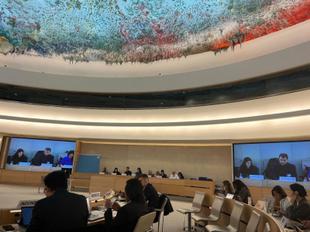Worker-driven remedy at the 12th UN Forum on Business and Human Rights
Electronics Watch was pleased to co-organise a session on remedy with the University of Greenwich at the recent UN Forum on Business and Human Rights, which took place from 27-29 November.
Held at UN Headquarters in Geneva, Switzerland, the Forum provides a multi-stakeholder platform for discussing key trends and challenges in implementing and advancing the UN Guiding Principles on Business and Human Rights. This 12th edition focused on the theme Towards Effective Change in Implementing Obligations, Responsibilities and Remedies.
Moderated by Olga Martin-Ortega, Electronic Watch's Senior Advisor on Remediation in Global Supply Chains, the session took place in one of the largest conference rooms at the Palais des Nations, the Human Rights and Alliance of Civilizations Room with its iconic ceiling sculpture. A panel featuring public buyers, worker advocates, trade unions and business representatives offered a practical perspective on worker-driven remedy and how it can be implemented.
Electronics Watch believes that the determination of appropriate and effective remedy should be based on rights holders directly affected by the harm – in global supply chains, this is usually workers – and reflect their expectations, perspectives, and needs. However, remedy is often led by the interests and priorities of companies, with workers treated as passive recipients.
As Electronics Watch Executive Director Björn Claeson said during the session, "We need a paradigm shift, from company-controlled due diligence, to a worker-driven driven due diligence model where workers' rights, needs and perspectives are paramount."
This requires a rethink of the objective of due diligence: not to protect against reputational risk, but to protect workers from harm. It also means rethinking the process: workers must help determine the remedy owed to them, supported by trade unions, worker representatives and human rights defenders. The standard process of audits and corrective actions, controlled by corporate actors every step of the way, and where companies decide what remedy to provide, if any, is not sufficient on its own. We also need to rethink the outcomes: it cannot only be corrective action or compliance. Remedy should instead be about reparation measures based on workers' rights, reflecting their needs, expectations and perspectives, with the ultimate goal of restoring those who have suffered harm to the situation they would be in had they not.
This is why Electronics Watch has developed Principles for Worker-Driven Remedy, in consultation with trade unions, labour rights organisations, and public buyers and based on legal research from Martina Trusgnach and Olga Martin-Ortega (University of Greenwich). Workers are the direct inspiration behind the Principles, as workers know what they need and usually seek ways to contribute their ideas to improve their workplaces.
The session focused on learning opportunities, with practical ideas for implementation that go beyond social audit and other industry-driven approaches.
Rights-holder engagement is crucial for remedy to be effective. Joseph Paul Maliamauv (Tenaganita, Malaysia) and Gopinath Parakuni (Cividep, India), both monitoring partners of Electronics Watch, highlighted workers' vulnerability when they lack awareness of their rights. Where trade union presence is weak, even access to workers can be a challenge, making communication and engagement difficult. Migrant workers are in an even more precarious situation, with job insecurity and fear of reprisal often preventing them even considering remedy. Ruwan Subasinghe, Legal Director at the International Transport Workers' Federation (ITF), emphasised the importance of removing such barriers to worker participation in the remedy process, and the key role of trade unions in helping to identify and implement a variety of appropriate remedies that genuinely meet workers' needs. "These Principles can be used to assist trade unions in their efforts to strengthen existing grievance mechanisms in collective bargaining agreements. Collective bargaining provides for a negotiated remediation mechanism, with direct worker input. This is why we say that freedom of association and collective bargaining are enabling rights, that unlock access to other rights," he said.
Irene Aycinena, Sustainability Assurance Manager at Grupo HAME Guatemala, shared the business perspective and the example of the grievance channel developed by her company. And speaking as a public buyer, Pauline Göthberg, National Coordinator of Electronics Watch affiliate, the Swedish Regions, reflected on how public buyers can be critical drivers of change. Thanks to their leverage over suppliers, they can enable remedy with rights-holders at the core: states have significant power as economic actors, and there is huge potential in public procurement to enable remedy.
Electronics Watch invites supply chain actors and stakeholders, to review, comment, adopt and adapt the Principles for Worker Driven Remedy, and most important, to test these principles in their own work.
You can watch a recording of the full session on the UN website here https://webtv.un.org/en/asset/k10/k10guhlkqt


